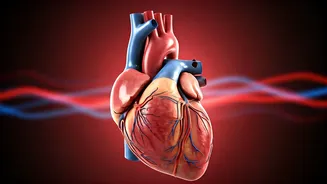Muscle and Bone Decline
One of the earliest effects of a lack of exercise is the weakening of muscles. Without regular physical activity, muscles begin to lose their strength
and mass, a process known as muscle atrophy. This decline affects overall physical performance, making everyday tasks, like carrying groceries or climbing stairs, more difficult. Simultaneously, bones also suffer. The skeletal system responds to the mechanical stress of exercise by becoming denser and stronger. When this stress is absent, bones lose their strength and become more susceptible to fractures and conditions like osteoporosis. Regular weight-bearing exercises, such as walking or running, are vital to maintain bone density and prevent age-related bone loss. Engaging in exercises that challenge the muscles and bones is crucial for long-term physical health and mobility, preventing age-related decline and maintaining an active lifestyle.
Mood and Mental Health
The relationship between exercise and mental well-being is significant. A lack of physical activity can negatively affect mood and contribute to mental health issues. Exercise releases endorphins, natural mood lifters, that combat feelings of stress, anxiety, and depression. A sedentary lifestyle deprives the body of these beneficial chemicals, leading to mood swings and a higher risk of developing mental health conditions. Furthermore, exercise has been shown to improve cognitive function, including memory and focus. Regular physical activity can improve sleep quality, which is crucial for mental and emotional health. Integrating exercise into your routine is a proactive approach to mental well-being and a positive method of managing stress and enhancing overall emotional health. Making exercise a part of your daily life offers a natural way to support a healthy mind and promote mental clarity.
Immune System Weakness
A sedentary lifestyle can weaken the immune system, making the body more vulnerable to infections and illnesses. Regular exercise enhances the function of immune cells, improving their ability to fight off viruses and bacteria. Exercise also aids in the circulation of immune cells, allowing them to move more efficiently through the body. Conversely, inactivity depresses the immune system, making it less effective. This can lead to more frequent illnesses and a slower recovery time. Incorporating regular physical activity into your routine supports a robust immune response, enhancing the body's natural defenses. Even moderate exercise, like brisk walking or cycling, can significantly boost the immune system and protect against common illnesses. Prioritizing exercise is therefore a proactive measure to maintain health and support the body's ability to defend itself.
Increased Heart Risks
Inactivity increases the risk of heart disease and related cardiovascular issues. Lack of exercise contributes to several risk factors, including high blood pressure, elevated cholesterol levels, and the accumulation of plaque in the arteries. Regular physical activity helps to lower blood pressure, improve cholesterol profiles, and strengthen the heart muscle. Exercise helps to improve the efficiency of the cardiovascular system. As a result, the heart can pump blood more effectively, reducing strain and the risk of heart disease. Engaging in activities like brisk walking, jogging, or swimming is enough to protect against heart disease. Maintaining a consistently active lifestyle is crucial for preserving heart health. By integrating exercise into your daily routine, you can significantly reduce your risk of cardiovascular problems and improve your overall health.
Elevated Blood Sugar
Regular physical activity plays a critical role in regulating blood sugar levels. Without exercise, the body's ability to process glucose efficiently declines, leading to a rise in blood sugar levels. This can increase the risk of developing type 2 diabetes. Exercise enhances insulin sensitivity, allowing cells to utilize glucose more effectively, keeping blood sugar within a healthy range. Furthermore, exercise helps the body to burn excess glucose as energy, thus further supporting blood sugar control. Engaging in exercise, such as walking, cycling, or other activities, helps manage blood sugar levels and lowers the risk of insulin resistance. Incorporating regular physical activity is a crucial part of a lifestyle that supports optimal health and helps to prevent or manage diabetes.
Shorter Lifespan Risks
The impact of inactivity on longevity is significant, with a sedentary lifestyle potentially shortening lifespan. Studies have shown a strong correlation between physical inactivity and increased mortality rates. People who don't exercise regularly are more likely to experience various health problems, including heart disease, diabetes, and certain types of cancer, all of which can shorten life expectancy. Regular exercise, on the other hand, is associated with a longer, healthier life. Physical activity improves overall health, boosts the immune system, and reduces the risk of chronic diseases. Even moderate exercise, such as brisk walking for 30 minutes a day, can have a noticeable impact on lifespan. Prioritizing physical activity is, therefore, a crucial step in promoting longevity and maintaining a high quality of life.
Poor Posture and Pain
Prolonged sitting can lead to posture problems and back pain. When you sit for extended periods, your muscles and joints become stiff, leading to poor posture. The muscles that support the spine can weaken, increasing the risk of back pain and other musculoskeletal issues. A sedentary lifestyle is often associated with conditions like lower back pain and neck discomfort, as muscles become imbalanced and unable to effectively support the body. Regular exercise and movement can help to combat these effects. Strength training and stretching exercises help to strengthen the muscles that support the spine and improve posture. Incorporating regular breaks to stand up and move around throughout the day can also reduce the negative effects of prolonged sitting. Maintaining good posture and engaging in regular physical activity are critical for preventing and alleviating pain. They also promote overall musculoskeletal health.













